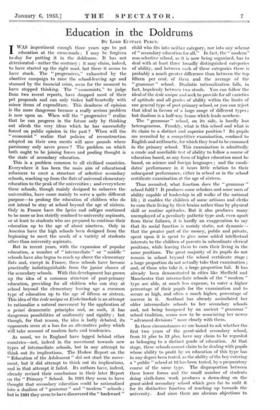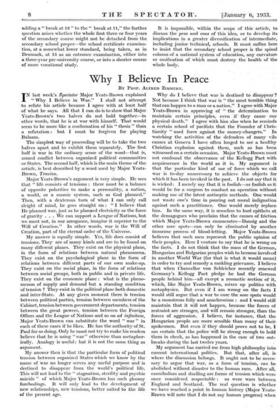Education in the Doldrums
BY LORD EUSTACE PERCY.
T WAS impertinent enough three years ago to put I education at the cross-roads ; I may be forgiven to-day for putting it in the doldrums. It has not deteriorated—rather the contrary ; it may claim, indeed, to have started up the right road, but there it seems to have stuck. The "progressives," exhausted by the abortive campaign to raise the school-leaving age and
stunned by the fmancial crisis, seem for the moment to have stopped thinking. The "economists," to judge from two recent reports, have dropped most of their pet proposals and can only tinker half-heartedly with minor items of expenditure. This deadness of opinion is the more dangerous because a really serious problem is now upon us. When will the " progressive " realize that he can progress in the future only by thinking out afresh the very ideas which he has successfully forced on public opinion in the past ? When will the " economist" realize that policies of reconstruction adopted on their own merits will save pounds where parsimony only saves pence ? The problem on which both ought to be joining forces and pooling thought is the state of secondary education.
This is a problem common to all civilized countries.
Everywhere it has been the main aim of educational reformers to erect a structure of selective secondary schools, reaching up from the fiats of universal elementary education to the peak of the universities ; and everywhere these schools, though mainly designed to subserve the universities, have come mainly to serve a quite different purpose—to prolong the education of children who do not intend to stay at school beyond the age of sixteen. Only in France have the lycees and colleges continued to be more or less strictly confined to university aspirants, or at least to students who are prepared to continue their education up to the age of about nineteen. Only in America have the high schools been designed from the beginning to meet the needs of a variety of students other than university aspirants.
But in recent years, with the expansion of popular education, a number of " intermediate " or " middle " schools have also begun to reach up above the elementary fiats and, except in France, these schools have become practically indistinguishable from the jimior classes of the secondary schools. With this development has grown up the idea of a common structure of post-primary education, providing for all children who can stay at school beyond the elementary leaving age a common type of education up to the age of fifteen or sixteen. This idea of the ecole unique or Einheitssehule is an attempt to rationalize a natural movement by the application of a priori democratic principles and, as such, it has dangerous possibilities of uniformity and rigidity ; but though, for that reason, the idea is hotly debated, its opponents seem at a loss for an alternative policy which will take account of modern facts and tendencies.
As usual, we in England have lagged behind other countries—not, indeed in the movement towards new types of intermediate schools, but in any attempt to think out its implications. The Hadow Report on the "Education of the Adolescent" did not start the move- ment, but it did attempt to think out its implications, and in that attempt it failed. Its authors have, indeed, already revised their conclusions in their later Report on the " Primary " School. In 1926 they seem to have thought that secondary education could be rationalized into a dualism of " grammar " and " modern " schools ; but in 1981 they seem to have discovered the" backward" child who fits into neither category, nor into any scheme of" secondary education for all." In fact, the "modern" non-selective school, as it is now being organized, has to deal with at least three broadly distinguished categories of ability, and between each of these categories there is probably a much greater difference than between the top fifteen per cent, of them and the average of the " grammar " school. Dualistic rationalization falls, hi
fact, hopelessly between two stools. You can follow the ideal of the ecole unique and seek to provide for all varieties of aptitude and all grades of ability within the limits of one general type of post-primary school, or you can reject . that ideal in favour of a large range of different types ; but dualism is a half-way house which leads nowhere.
The " grammar " school, on its side, is hardly less heterogeneous. Frankly, what is this school and what is its claim to a distinct and superior position ? Its pupils are recruited by a competitive examination, confined to English and arithmetic, for which they tend to be crammed in the primary school. This examination is admittedly a crude and unreliable test of ability to follow a course of education based, as any form of higher education must be based, on science and foreign languages ; and the candi- dates' performance in it bears little relation to their subsequent performance, either in school or in the school certificate examination at the age of sixteen.
Thus recruited, what function does the " grammar " school fulfil ? It produces some scholars and some men of ability capable of leadership in all walks of the national life ; it enables the children of some artisans and clerks to earn their living by their brains rather than by physical skill or routine aptitudes. But it also produces many unemployed of a peculiarly pathetic type and, even apart from these failures, it is hardly an exaggeration to say that its social function is mainly static, not dynamic— that the greater part of the money, public and private, spent upon it is spent to give some added intellectual interests to the children of parents in subordinate clerical positions, while leaving them to earn their living in the same positions. The great majority of its pupils do not remain in school beyond the school certificate stage ; a large proportion do not actually take that examination ; and, of those who take it, a large proportion fail. It has already been demonstrated in cities like Sheffield and Manchester that intermediate schools of the " modern " type are able, at much less expense, to enter a higher percentage of their pupils for the examination and to secure as high, and often a much higher, percentage of success in it. Scotland has already assimilated her older intermediate schools to her secondary schools and, not being hampered by an ancient " grammar " school tradition, seems now to be associating her newer "advanced divisions" more closely with them.
In these circumstances we are bound to ask whether the first two years of the grant-aided secondary school, from 11 plus to 13 plus, have any claim to be regarded as belonging to a distinct grade of education. At that stage, these schools cannot claim to be dealing with pupils whose ability to profit by an education of this type has in any degree been tested, as the ability of the boy entering a " public "school at 13 has been tested, by a preparatory course of the same type. The disproportion between these lower forms and the small number of students doing sixth-form ' work produces a down-drag on the grant-aided secondary school which goes far to unfit it for its distinctive function of reaching up towards* the university. And side there are obvious objections to adding a " break at 13 "to the" break at 11," the further question arises whether the whole first three or four years of the secondary course might not be detached from the secondary school proper—the school certificate examina- tion, at a somewhat lower standard, being taken, as in Denmark, at 15 as an entrance examination, either into a three-year pre-university course, or into a shorter course of more vocational study. It is impossible, within the scope of this article, to discuss the pros and cans of this idea, or to develop its implications in a greater diversification of intermediate, including junior technical, schools. It must suffice here to insist that the secondary school proper is the spinal column of a national system of education, any curvature or ossification of which must destroy the health of the whole body.





































 Previous page
Previous page